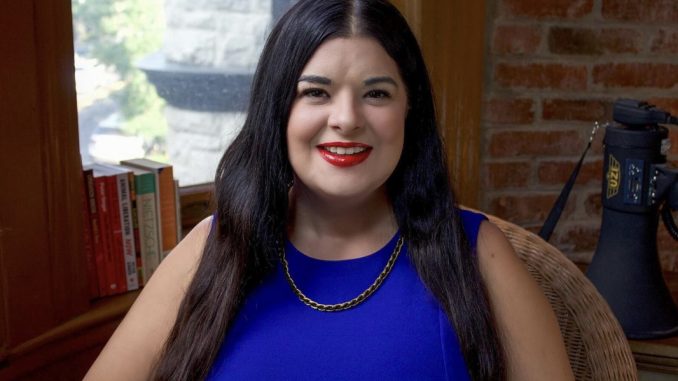
Democratic presidential candidate Terrisa Bukovinac is going against all stereotypes. She’s a female, pro-life, atheist, Democrat who has a mission to restrict abortion rights through activism and now through her presidential campaign.
Bukovinac grew up in the small town of Adrian, Mich., before moving to the big city in Atlanta, Ga. when she turned 19. While spending time in Atlanta, Bukovinac worked as a store manager at Starbucks for nearly a decade. Then wanting some adventure she moved to San Francisco. While in San Francisco, Bukovinac found her love for fashion, and worked in corporate for Louis Vuitton for four years. However, Bukovinac wanted more.
“I actually left my job in fashion to pursue full time activism,” Bukovinac said. She then founded the group “Pro-Life San Francisco” which she describes as a “multi-partisan, non-sectarian group of pro-life people who are fighting for the lives of the unborn.”
It was then that Bukovinac started going to every Democratic debate she could, and organized several protests. Following this, she later became the President of Democrats for Pro-Life America before she founded another organization called Progressive Anti-Abortion Uprising.
While at Progressive Anti-Abortion Uprising, Bukovinac took a trip to an abortion clinic in Washington, D.C. where she saw remains from aborted fetuses. She said that “it was the most soul crushing and life changing experience” ever. Following this experience, Bukovinac felt she had to do more than attend debates and protest.
So now, she has taken the initiative to run under the Democratic Party for president. “I couldn’t go through another election cycle where we have no representation,” she says.
Kristin Turner, Bukovinac’s corporate campaign secretary, says that most Democrats in the past have openly supported abortion rights and had pro-choice mindsets, but that Terissa is challenging these stereotypes. Turner says, “Terissa’s campaign seeks to break up that relationship, challenge those ideas, and to hold our own party accountable.” Turner also notes that Bukovinac is also “giving a voice to young Democrats who are leftist and progressive and don’t have a party to vote for.”
To do this, Bukovinac is using her own personal, first-hand experiences in her campaign video and ads. She made it a point to show the world what she saw when she was in DC.
“I realized if I ran for president I would be able to run ads uncensored, so I knew I had to try,” she said. In her ads, she includes the raw video footage from when she was in DC with the fetal remains. She says her reasoning for doing this is to make people come face to face with her issue. Bukovinac notes that showing these remains may be considered controversial or offensive, and that she may be “hated” for it, but she says that she sees no downside to what she is doing. Instead, she sees this as an initiative to show people her views on abortion and spread awareness.
To Bukovinac, so far she has seen the ads as a success. She notes that it has been going better than she expected. However, Monica Snyder, the Executive Director of Secular Pro-Life feels that these ads may be effective but it may also turn people away. She said that, “essentially Terrisa is leaning in very hard to what the pro-life side calls abortion victim photography and what other people may call graphic images. I think sometimes it’s alienating and sometimes it’s highly effective.”
Snyder’s organization takes a poll about twice a year on social media, asking people that used to be pro-choice but are now pro-life what changed their minds. She says that there is typically a group of people on the survey who say they were “so shocked” after seeing uncensored images or videos of aborted fetuses, that they became pro-life. She continues that due to these findings on the poll, it may prove that these images or videos may be effective some of the time. Snyder adds that she does not “think it’s immoral” and that it is an “important tool” in human rights activism, to allow people to see and recognize what abortions may do.
For Bukovinac, the chance to run and post these uncensored ads is enough for her. “I know I don’t have a chance of winning any of these primaries,” she says. She said she hasn’t even thought that far since her campaign is so “narrowly focused on running the ads.” Bukovinac acknowledges that she does not have the kind of money to spend on her campaign to create any kind of national platform. She wants to “pave the way” for future candidates and to provide pro-life Democratic representation in this election.
“I will not be silenced,” Bukovinac says. She feels people need to know about what abortions do and why she feels they should be stopped. “I have had an experience that people need to know about… there are thousands of late term abortions.” She says, referring to her DC trip. However, Bukovinac says she sees little hope in moving forward after the primaries
As she mentioned, her main goal was never to win the primaries, but instead to force people to see her issue, give pro-life democrats a place to vote, and spread awareness. She encourages people who have similar views as her to speak out regardless of their political party, religion, etc. She says when in conversations about being pro-choice, “the most important thing you can do is say I disagree. You don’t have to get into the nitty gritty or details of your position. Do the bare minimum of saying I disagree.” She says that by doing just this makes a huge difference.

Be the first to comment